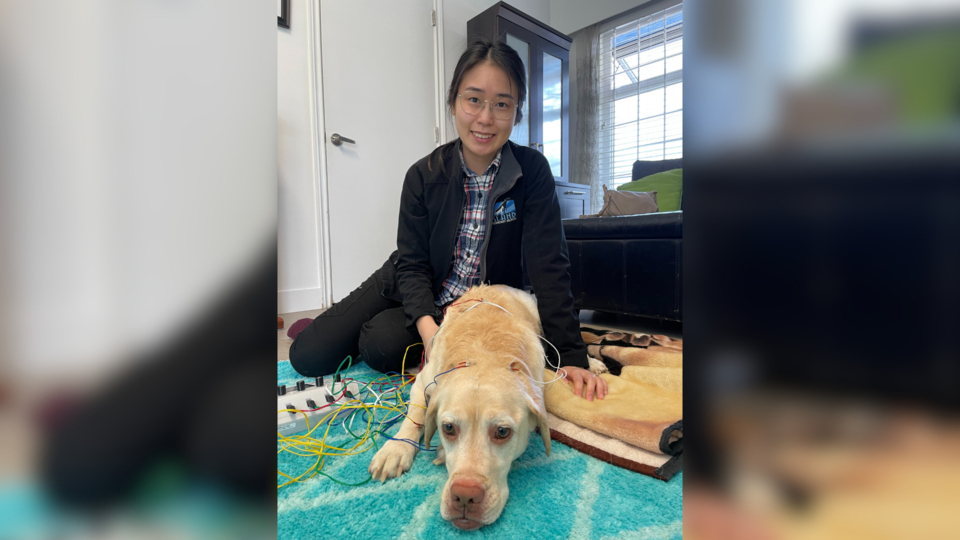Did you know pets can also be treated with Traditional Chinese medicine (TCM) and acupuncture?
Richmondites are no strangers to TCM, as the city has the . But lesser known to the public is the subset of TCM practitioners that tend to four-legged community members.
June Siu, from Island Veterinary Hospital on No. 4 and Westminster Hwy., is part of a growing group of veterinarians offering such services in the Lower Mainland.
She is a certified acupuncturist and herbalist and began treating dogs and cats with TCM at Island Veterinary Hospital about two years ago, often for illnesses such as intervertebral disc or neurologic diseases.
In fact, many of her patients tend to be animals suffering from diseases considered incurable in Western medicine.
"And usually, the goal is to improve the quality of life and to extend the life with good quality," she explained, adding that the treatment typically involves herbal medicine or acupuncture, which have "minimal side effects" when administered by a qualified individual.
Traditional Chinese veterinary medicine is derived from TCM for humans and equines, Siu told the Richmond News, and references to treatments for horses and cattle can be traced back to ancient Chinese literature.
A full course of treatment usually takes about two to three months, but there are also times when quick effects can be achieved with TCM, such as when Siu resuscitated a kitten using acupuncture.
"This one time, we had a kitten that was very weak, and it looked like it was dying and I couldn't really hear its heart," she recalled, adding the kitten was so small that most equipment didn't fit on it.
"And I wanted to do as much as I could, so I started putting needles in this little kitten, and within a minute, I was able to hear its heart beating really strong. So that, to me, was a really positive sign that it was working and working very fast."
While Siu specializes in dogs and cats at the clinic, she said TCM is used by some vets to treat other pets such as rabbits, lizards and snakes.
TCM for pets versus humans
Rather than boiled concoctions, which are common for humans, herbal medicine for pets usually comes in powder form.
"Not all herbal medicine is bitter, and usually the herbal medicine is prescribed according to their pattern diagnosis. So their body actually needs it," Siu explained.
"So they will actually want to eat it. Even if they taste it... they wouldn't be averse to it."
It's easier than getting humans to drink their bowls of medicine, but Siu usually encourages owners to give their pets a treat after "so that they know that's a good thing."
The acupuncture points for humans and animals are also similar, with the main difference being the anatomy.
"Locating acupuncture points for dogs and cats, usually it's a combination of human medicine and also equine medicine," said Siu.
For example, the baihui point (which translates to "hundred convergences" in English) normally in the middle of the top of a person's head would be on the rump of a dog or a horse as that is the point that's closest to the sun.
And when it comes to practicing acupuncture on animals, the key is to make them feel comfortable during the 20 to 30-minute long sessions.
"(For) a human, you can tell them, 'Well, you chose to do this, so you're gonna lay down, you're gonna sit here and wait," said Siu.
"But you cannot do that with an animal."
To achieve that, the clinic's treatment space is decorated to look like a living room with blankets and "lots of treats." Owners are often there to keep their pets company, and Siu also talks to the animals to put them at ease.
"I do have to learn (for) each patient how they are and respect their boundaries. Some pets give me five minutes to put my needles in them. That's it," she added.
But it's actually easier than it sounds to keep the animals still, Siu told the News.
"Oftentimes, what it looks like is they come in, I have a chat with the owners and get them to relax, put a needle in, and ... within a few minutes, you can see the pet kind of (relax) and get all sleepy," she said, adding that some pets actually fall asleep.
The "silly answer" for her interest in TCM, Siu told the News, is that she was inspired by Chinese period dramas, which told tales of people freezing in place when poked at certain pressure points and herbal concoctions promising eternal life.
After finishing vet school, she got her certification in traditional Chinese veterinary medicine at Chi University in Florida.
To Siu, TCM is simply one step further into "fully understanding your pets."
"A lot of (TCM) is observing with looking, feeling, smelling and hearing... And so as a veterinarian, we are already trained to be more observant of our patients because we cannot speak (their) language," she said, adding that she sees this skill set as one tool in her toolbox.
Got an opinion on this story or any others in Richmond? or email your thoughts or story tips to [email protected]. To stay updated on Richmond news, sign up for our .


